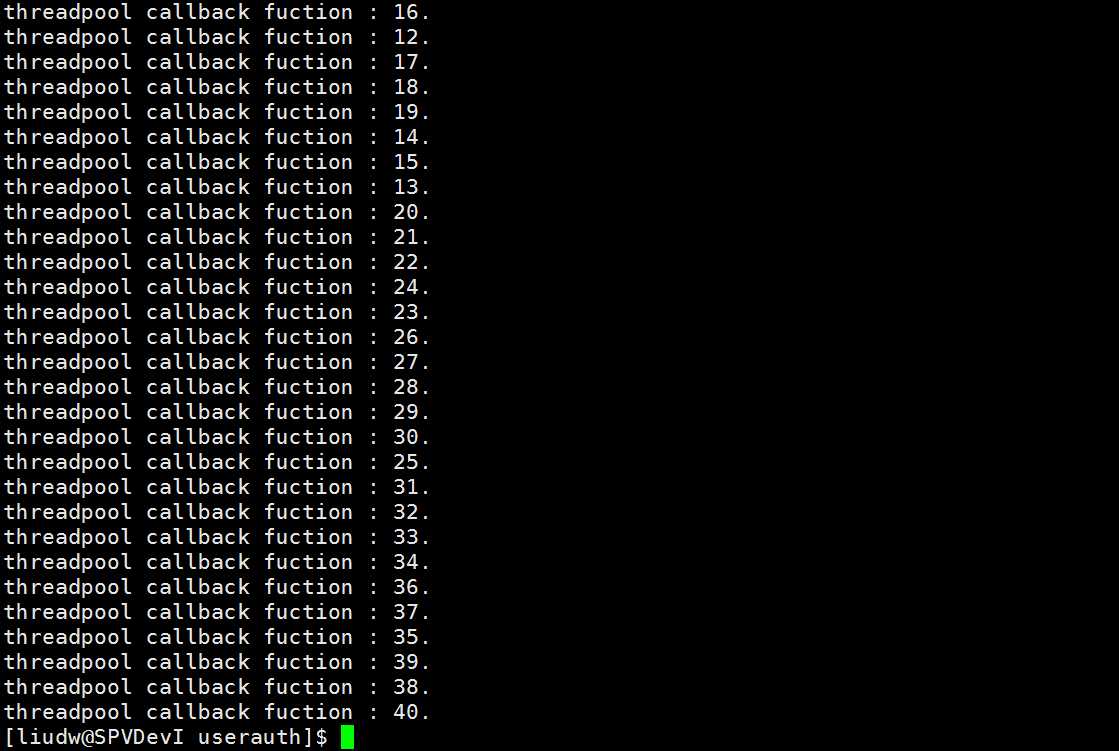标签:执行时间 循环 输入 signal bubuko not inf 例子 png
前言:前面有篇博客已经介绍了线程、线程的信号量和互斥锁,请参考博客:http://www.cnblogs.com/liudw-0215/p/8966645.html,接下来将介绍线程池。
线程池能有效的处理多个线程的并发问题,避免大量的线程因为互相强占系统资源导致阻塞现象,能够有效的降低频繁创建和销毁线程对性能所带来的开销。
大多数的网络服务器,包括Web服务器都具有一个特点,就是单位时间内必须处理数目巨大的连接请求,但是处理时间却是比较短的。在传统的多线程服务器模型中是这样实现的:一旦有个请求到达,就创建一个新的线程,由该线程执行任务,任务执行完毕之后,线程就退出。这就是"即时创建,即时销毁"的策略。尽管与创建进程相比,创建线程的时间已经大大的缩短,但是如果提交给线程的任务是执行时间较短,而且执行次数非常频繁,那么服务器就将处于一个不停的创建线程和销毁线程的状态。这笔开销是不可忽略的,尤其是线程执行的时间非常非常短的情况。
线程池就是为了解决上述问题的,它的实现原理是这样的:在应用程序启动之后,就马上创建一定数量的线程,放入空闲的队列中。这些线程都是处于阻塞状态,这些线程只占一点内存,不占用CPU。当任务到来后,线程池将选择一个空闲的线程,将任务传入此线程中运行。当所有的线程都处在处理任务的时候,线程池将自动创建一定的数量的新线程,用于处理更多的任务。执行任务完成之后线程并不退出,而是继续在线程池中等待下一次任务。当大部分线程处于阻塞状态时,线程池将自动销毁一部分的线程,回收系统资源。
下面是一个简单线程池的实现,这个线程池的代码是我参考网上的一个例子实现的,并进行了加工和修改。
主要由三个文件组成:threadpool.h头文件、threadpool.c源文件和mainpool.c组成。源码中已有重要的注释,就不加以分析了。
#include "my.h" struct job { void* (*callback_function)(void *arg); //线程回调函数
void *arg; //回调函数参数 struct job *next; }; struct threadpool { int thread_num; //线程池中开启线程的个数 int queue_max_num; //队列中最大job的个数 struct job *head; //指向job的头指针 struct job *tail; //指向job的尾指针 pthread_t *pthreads; //线程池中所有线程的pthread_t pthread_mutex_t mutex; //互斥信号量 pthread_cond_t queue_empty; //队列为空的条件变量 pthread_cond_t queue_not_empty; //队列不为空的条件变量 pthread_cond_t queue_not_full; //队列不为满的条件变量 int queue_cur_num; //队列当前的job个数 int queue_close; //队列是否已经关闭 int pool_close; //线程池是否已经关闭 }; //================================================================================================ ////函数名: threadpool_init ////函数描述: 初始化线程池 ////输入: [in] thread_num 线程池开启的线程个数 //// [in] queue_max_num 队列的最大job个数 ////输出: 无 ////返回: 成功:线程池地址 失败:NULL ////================================================================================================ //struct threadpool* threadpool_init(int thread_num, int queue_max_num); // ////================================================================================================ ////函数名: threadpool_add_job ////函数描述: 向线程池中添加任务 ////输入: [in] pool 线程池地址 //// [in] callback_function 回调函数 //// [in] arg 回调函数参数 ////输出: 无 ////返回: 成功:0 失败:-1 ////================================================================================================ int threadpool_add_job(struct threadpool *pool, void* (*callback_function)(void *arg), void *arg); // ////================================================================================================ ////函数名: threadpool_destroy ////函数描述: 销毁线程池 ////输入: [in] pool 线程池地址 ////输出: 无 ////返回: 成功:0 失败:-1 ////================================================================================================ int threadpool_destroy(struct threadpool *pool); // ////================================================================================================ ////函数名: threadpool_function ////函数描述: 线程池中线程函数 ////输入: [in] arg 线程池地址 ////输出: 无 ////返回: 无 ////================================================================================================ void* threadpool_function(void* arg);
#include "threadpool.h" #include "my.h" struct threadpool* threadpool_init(int thread_num, int queue_max_num) { struct threadpool *pool = NULL; do { pool = malloc(sizeof(struct threadpool)); if (NULL == pool) { printf("failed to malloc threadpool!\n"); break; } pool->thread_num = thread_num; pool->queue_max_num = queue_max_num; pool->queue_cur_num = 0; pool->head = NULL; pool->tail = NULL; if (pthread_mutex_init(&(pool->mutex), NULL)) { printf("failed to init mutex!\n"); break; } if (pthread_cond_init(&(pool->queue_empty), NULL)) { printf("failed to init queue_empty!\n"); break; } if (pthread_cond_init(&(pool->queue_not_empty), NULL)) { printf("failed to init queue_not_empty!\n"); break; } if (pthread_cond_init(&(pool->queue_not_full), NULL)) { printf("failed to init queue_not_full!\n"); break; } pool->pthreads = malloc(sizeof(pthread_t) * thread_num); if (NULL == pool->pthreads) { printf("failed to malloc pthreads!\n"); break; } pool->queue_close = 0; pool->pool_close = 0; int i; for (i = 0; i < pool->thread_num; ++i) { pthread_create(&(pool->pthreads[i]), NULL, threadpool_function, (void *)pool); } return pool; } while (0); return NULL; } int threadpool_add_job(struct threadpool* pool, void* (*callback_function)(void *arg), void *arg) { assert(pool != NULL); assert(callback_function != NULL); assert(arg != NULL); pthread_mutex_lock(&(pool->mutex)); while ((pool->queue_cur_num == pool->queue_max_num) && !(pool->queue_close || pool->pool_close)) { pthread_cond_wait(&(pool->queue_not_full), &(pool->mutex)); //队列满的时候就等待 } if (pool->queue_close || pool->pool_close) //队列关闭或者线程池关闭就退出 { pthread_mutex_unlock(&(pool->mutex)); return -1; } struct job *pjob =(struct job*) malloc(sizeof(struct job)); if (NULL == pjob) { pthread_mutex_unlock(&(pool->mutex)); return -1; } pjob->callback_function = callback_function; pjob->arg = arg; pjob->next = NULL; if (pool->head == NULL) { pool->head = pool->tail = pjob; pthread_cond_broadcast(&(pool->queue_not_empty)); //队列空的时候,有任务来时就通知线程池中的线程:队列非空 } else { pool->tail->next = pjob; pool->tail = pjob; } pool->queue_cur_num++; pthread_mutex_unlock(&(pool->mutex)); return 0; } void* threadpool_function(void* arg) { struct threadpool *pool = (struct threadpool*)arg; struct job *pjob = NULL; while (1) //死循环 { pthread_mutex_lock(&(pool->mutex)); while ((pool->queue_cur_num == 0) && !pool->pool_close) //队列为空时,就等待队列非空 { pthread_cond_wait(&(pool->queue_not_empty), &(pool->mutex)); } if (pool->pool_close) //线程池关闭,线程就退出 { pthread_mutex_unlock(&(pool->mutex)); pthread_exit(NULL); } pool->queue_cur_num--; pjob = pool->head; if (pool->queue_cur_num == 0) { pool->head = pool->tail = NULL; } else { pool->head = pjob->next; } if (pool->queue_cur_num == 0) { pthread_cond_signal(&(pool->queue_empty)); //队列为空,就可以通知threadpool_destroy函数,销毁线程函数 } if (pool->queue_cur_num == pool->queue_max_num - 1) { pthread_cond_broadcast(&(pool->queue_not_full)); //队列非满,就可以通知threadpool_add_job函数,添加新任务 } pthread_mutex_unlock(&(pool->mutex)); (*(pjob->callback_function))(pjob->arg); //线程真正要做的工作,回调函数的调用 free(pjob); pjob = NULL; } } int threadpool_destroy(struct threadpool *pool) { assert(pool != NULL); pthread_mutex_lock(&(pool->mutex)); if (pool->queue_close || pool->pool_close) //线程池已经退出了,就直接返回 { pthread_mutex_unlock(&(pool->mutex)); return -1; } pool->queue_close = 1; //置队列关闭标志 while (pool->queue_cur_num != 0) { pthread_cond_wait(&(pool->queue_empty), &(pool->mutex)); //等待队列为空 } pool->pool_close = 1; //置线程池关闭标志 pthread_mutex_unlock(&(pool->mutex)); pthread_cond_broadcast(&(pool->queue_not_empty)); //唤醒线程池中正在阻塞的线程 pthread_cond_broadcast(&(pool->queue_not_full)); //唤醒添加任务的threadpool_add_job函数 int i; for (i = 0; i < pool->thread_num; ++i) { pthread_join(pool->pthreads[i], NULL); //等待线程池的所有线程执行完毕 } pthread_mutex_destroy(&(pool->mutex)); //清理资源 pthread_cond_destroy(&(pool->queue_empty)); pthread_cond_destroy(&(pool->queue_not_empty)); pthread_cond_destroy(&(pool->queue_not_full)); free(pool->pthreads); struct job *p; while (pool->head != NULL) { p = pool->head; pool->head = p->next; free(p); } free(pool); return 0; }
mainpool.c文件:
#include "threadpool.h" void* work(void* arg) { char *p = (char*) arg; printf("threadpool callback fuction : %s.\n", p); sleep(1); } int main(void) { struct threadpool *pool = (struct threadpool *)threadpool_init(10, 20); threadpool_add_job(pool, work, "1"); threadpool_add_job(pool, work, "2"); threadpool_add_job(pool, work, "3"); threadpool_add_job(pool, work, "4"); threadpool_add_job(pool, work, "5"); threadpool_add_job(pool, work, "6"); threadpool_add_job(pool, work, "7"); threadpool_add_job(pool, work, "8"); threadpool_add_job(pool, work, "9"); threadpool_add_job(pool, work, "10"); threadpool_add_job(pool, work, "11"); threadpool_add_job(pool, work, "12"); threadpool_add_job(pool, work, "13"); threadpool_add_job(pool, work, "14"); threadpool_add_job(pool, work, "15"); threadpool_add_job(pool, work, "16"); threadpool_add_job(pool, work, "17"); threadpool_add_job(pool, work, "18"); threadpool_add_job(pool, work, "19"); threadpool_add_job(pool, work, "20"); threadpool_add_job(pool, work, "21"); threadpool_add_job(pool, work, "22"); threadpool_add_job(pool, work, "23"); threadpool_add_job(pool, work, "24"); threadpool_add_job(pool, work, "25"); threadpool_add_job(pool, work, "26"); threadpool_add_job(pool, work, "27"); threadpool_add_job(pool, work, "28"); threadpool_add_job(pool, work, "29"); threadpool_add_job(pool, work, "30"); threadpool_add_job(pool, work, "31"); threadpool_add_job(pool, work, "32"); threadpool_add_job(pool, work, "33"); threadpool_add_job(pool, work, "34"); threadpool_add_job(pool, work, "35"); threadpool_add_job(pool, work, "36"); threadpool_add_job(pool, work, "37"); threadpool_add_job(pool, work, "38"); threadpool_add_job(pool, work, "39"); threadpool_add_job(pool, work, "40"); sleep(5); threadpool_destroy(pool); return 0; }

标签:执行时间 循环 输入 signal bubuko not inf 例子 png
原文地址:https://www.cnblogs.com/liudw-0215/p/8968873.html